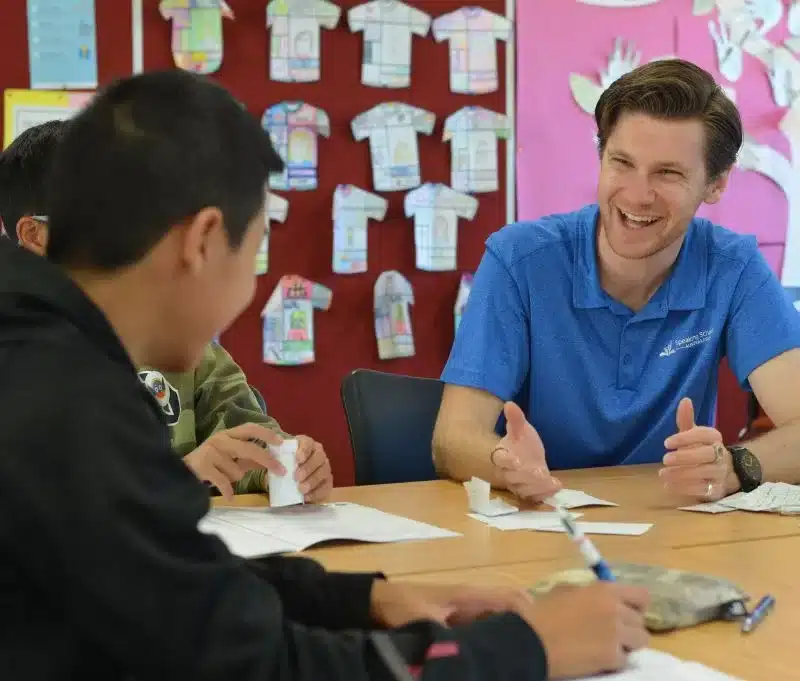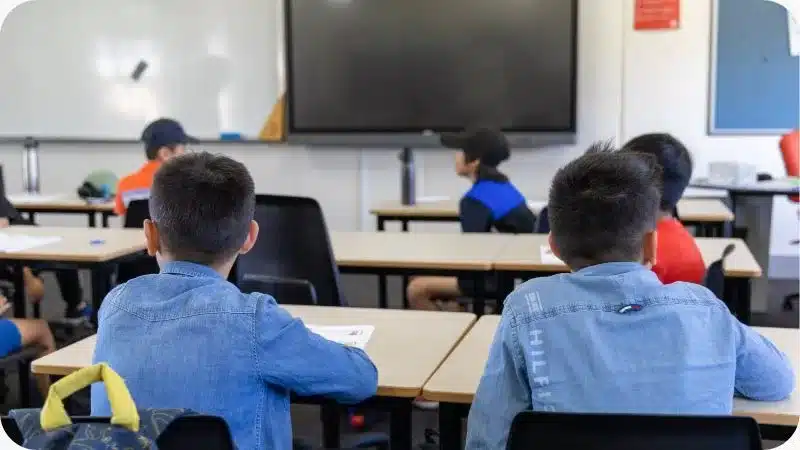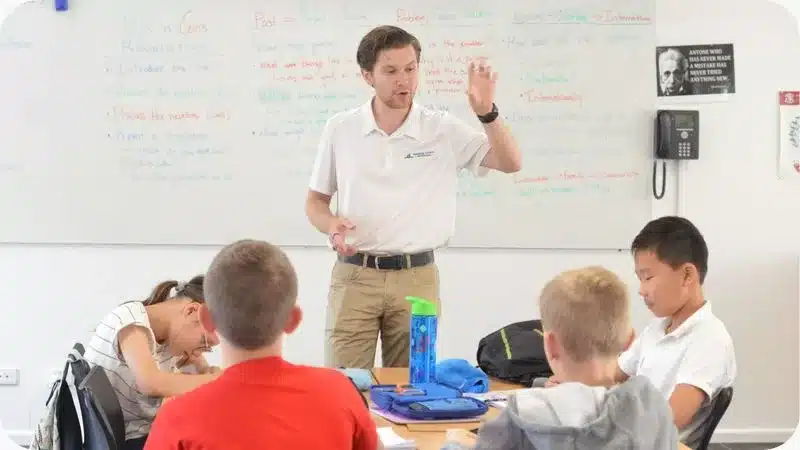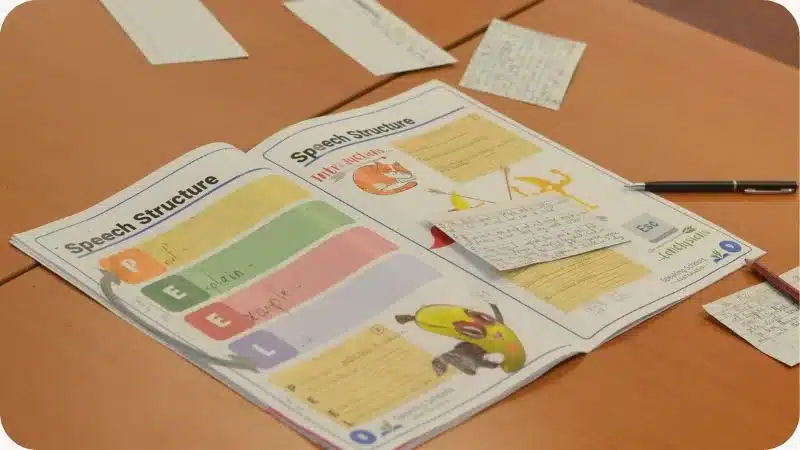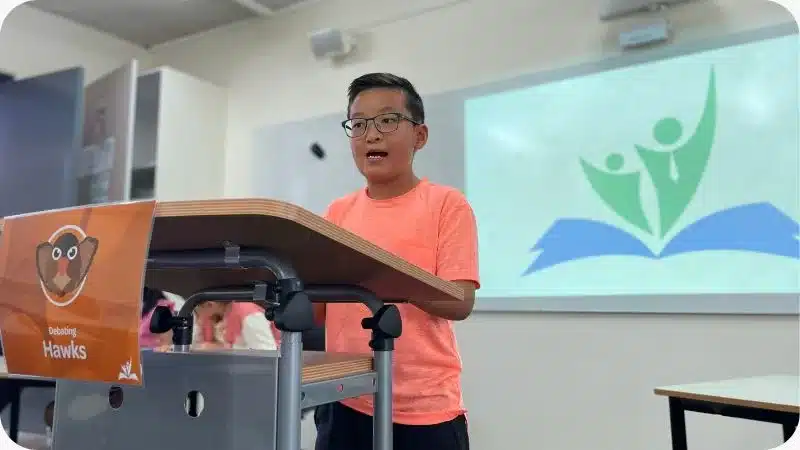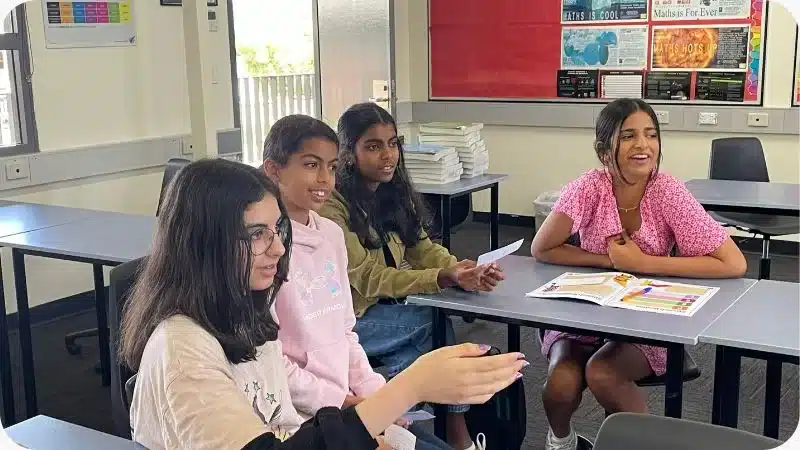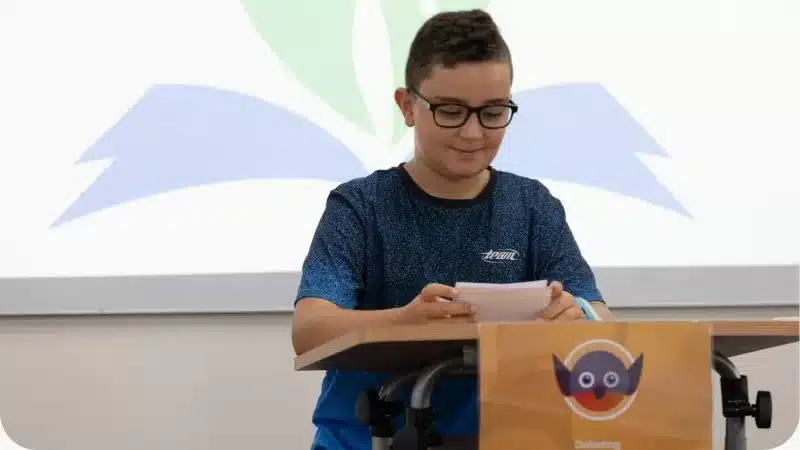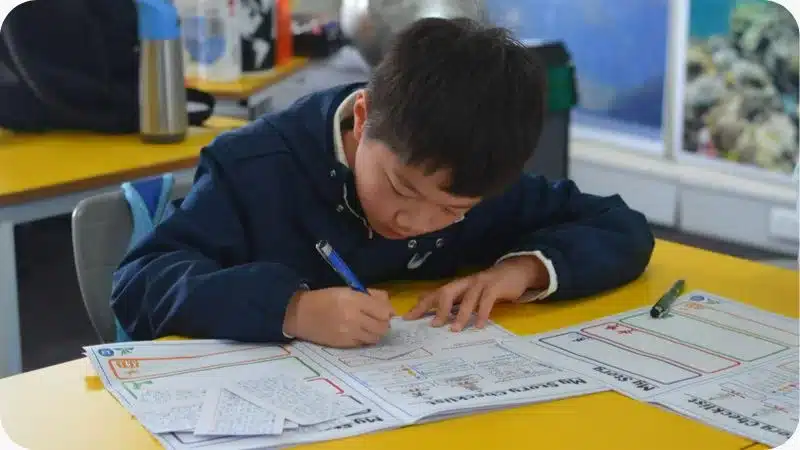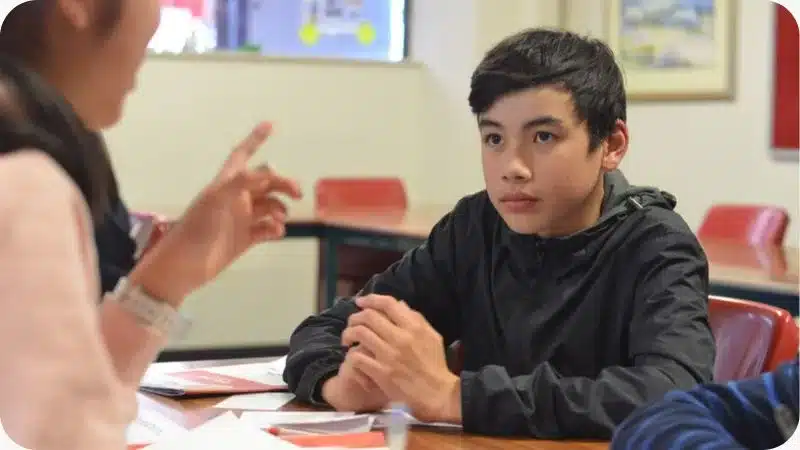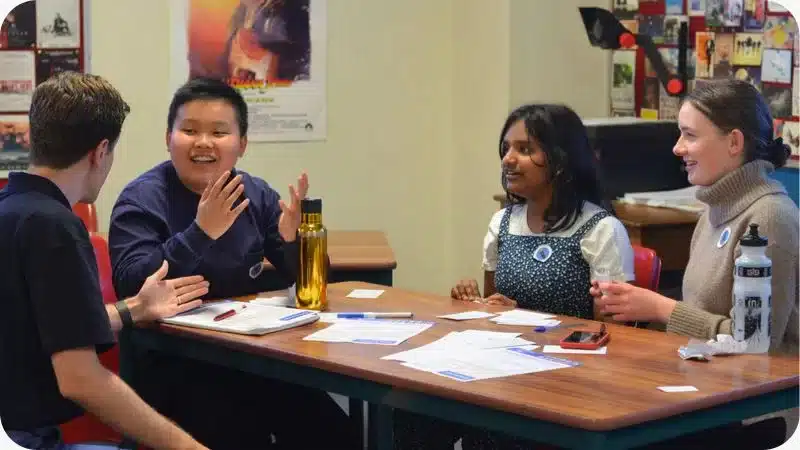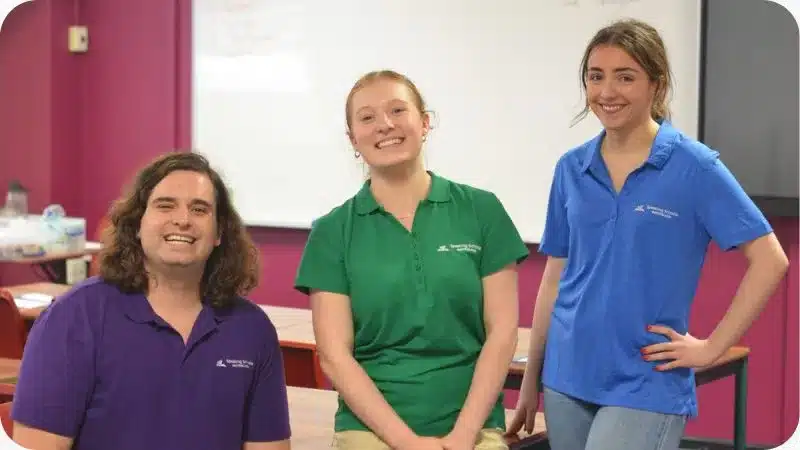Public Speaking and Debating Skills – A Tool for Success in Selective Schools Tests
8 March 2023
Whilst the Australian schooling system is split between public, private, Catholic systemic and homeschooling, there is a unique subset of ‘selective schools’ which exist within the public system of most states.
Whilst most of these are located in New South Wales – there are 17 fully selective, 25 partially selective and four agricultural schools – you can also find similar selective schools in most other states.
Let’s dive into what makes these schools special, their entry requirements and how public speaking and debating can help give students an edge.
What are selective schools?
Whilst selective schools sit within the public education system, they are unique in many ways.
Firstly, all students must pass a special test to enter (more on this below), which means that almost everyone who attends these schools is a high achiever. By grouping students of similar academic abilities, they can push one another to improve continually, raising the academic achievements of everyone within the cohort. There is also evidence that grouping gifted students together can similarly be good for their emotional well-being.
Secondly, given the students can get through content faster than in comprehensive schools, this means that teachers can move through concepts at an accelerated rate. This not only means they get to more complex ideas earlier, but also helps students feel a greater level of satisfaction with their schooling.
Thirdly, they get the advantage of having more money to invest in education without the requisite school fees for parents. Whilst there aren’t any additional school fees, it’s been reported that selective schools obtain approximately $1.4 million more in voluntary donations than comprehensive schools – given these are government bodies, this money is then directly re-invested back into the students, helping build their education.
Finally, they simply get good academic results. Of the Top 10 schools that completed the NSW Higher School Certificate in 2022 – including all private schools in the state – six were selective schools. One particular school – James Ruse Agricultural College – topped the HSC Honours List for the 27th year in a row (yes, every year since the late 1990s). Many of those looking for great academic results can find them in the selective system.
Selective schools sound great – what’s the catch?
As with all great things, there is no such thing as a free lunch when it comes to selective schools.
Selective schools require special tests to enter. Whilst these vary from state to state, they generally involve elements of reading comprehension, mathematical reasoning, writing skills and critical thinking. Importantly, rather than assessing previous success, these tests are tailored towards assessing future ability – they are designed to ensure that the students entering selective schools are ready for the rigours ahead.
Given the unique opportunities these selective schools offer, it’s no surprise that many parents would love for their children to attend. That said, for the 2023 NSW selective school exam, over 15,000 applicants are vying for only 4,248 places (for comparison, there are around 60,000 students in each grade at public schools in NSW).
Given the stiff competition, it’s similarly unsurprising how much additional effort and investment parents are willing to undertake to help their child secure a spot.
Sounds hard – what’s on the selective schools test?
Whilst there are sections on comprehension, mathematics, and writing, the most significant single section in the NSW test (comprising 35% of the final grade) looks at ‘thinking skills’, whilst half of the Victorian test relates to ‘General Ability – Verbal, Quantitative and Writing’. We’ll use the phrase ‘critical thinking skills’ to refer to these concepts (to keep things simple).
Critical thinking skills are essential for success in life generally. Having the ability to think critically and objectively about any given situation is crucial for making informed decisions and taking appropriate action. Being able to evaluate information accurately, analyse different points of view, combine reason with intuition, spot inconsistencies, and question assumptions are all essential parts of critical thinking. This can allow us to effectively solve problems and make better decisions both in our personal life as well as in our professional lives. Having a sound approach to critical thinking can also help us delve deeper into a topic or issue that we may not be familiar with in order to gain a deeper understanding of it. Therefore, critical thinking is an invaluable skill that everyone should strive to develop and use throughout their lives.
So, pretty important. But what do these critical thinking skills questions look like in practice?
The NSW Department of Education has several practice questions on its website to help students identify the type of questions they might be asked – one example from their website is:
To become a successful architect, you need to be creative and also have excellent attention to detail.
Will: “Sally is creative – she loves drawing and painting – and always checks her written work carefully. She’s sure to become a great architect.”
Evie: “James enjoys writing stories and has a vivid imagination, but he struggles with detailed tasks. Architecture is probably not for him.”
If the information in the box is true, whose reasoning is correct?
This type of question (as well as many others within the test) looks at formal logic – but what’s the best way to develop these types of skills?
Winning the selective schools test with public speaking & debating
One way of improving critical thinking skills is to learn formal logic (although this is something that children find very difficult), whilst another is to sit lots and lots of practice tests (noting that these become repetitive over time).
However, there is another way to boost your child’s chances of success on a selective school test – developing public speaking and debating skills.
So how can this help?
Learning logic in a real-life setting
Through debating, students learn how to construct logical and persuasive arguments in three ways.
Firstly, it helps students come up with logical arguments in real time. To win debates, you need to understand what your team’s case is, work with others in your team to express it clearly and ensure that each of your points is logical. This is a creative process during prep, but something that must be done quickly given time constraints.
Secondly, students are also required to recognise logical flaws in their opposition’s arguments too. This helps them develop a critical eye for logical inconsistencies under strict time constraints, an essential skill for selective skills tests.
Thirdly, students are required to defend the arguments made by others. When rebutting, it is never enough simply to attack the other team – you must also defend the points raised by your earlier speakers. By recognising where the other team has found logical flaws and patching them up, students develop an even stronger understanding of how to express themselves logically.
Quick thinking under pressure
Thinking quickly under pressure is another critical skill debating teaches students.
In a debate, students must think on their feet while responding to opponents – this requires quick thinking to ensure not only that they’re speaking coherently but also that what they are saying makes sense.
Moreover, when engaging with impromptu speeches, students are required to develop complex ideas without much (if any) preparation time before presenting them without having any opportunity to practice this particular speech.
Through practice, students are able to develop a sort of resilience in time-pressured situations such as examinations. In many ways, public speaking and debating are even more effective than practice papers – when presenting to an audience, there is always a level of pressure to perform (something that isn’t always true of lower-stakes practice papers).
Given this, regular public speaking and debating training can make a huge difference to a student’s ability to think quickly under pressure.
Developing creative ideas
Debating and public speaking are not just effective tools to develop confidence and communication skills, they also help students learn how to generate creative ideas.
Through debating, students have to think on their feet to come up with quick and convincing arguments. In doing so, they learn how to express themselves clearly while being able to think outside the box.
Public speaking similarly encourages students to expand their thoughts and be comfortable sharing them with others. As students build their speeches, they must develop innovative ways to capture and engage an audience which teaches them how to utilise diverse methods of communication.
Overall, debating and public speaking are invaluable tools for helping students develop creative ideas which can be applied in various settings – including (but not limited to) the written section of a selective schools examination.
Comprehending others
Debating and public speaking are invaluable skills that also help students comprehend others better.
Debating achieves this in two ways. Firstly, it forces students to predict and consider what they think their opponents will present in order to make their arguments more persuasive. Developing this understanding of alternative perspectives can really help students with comprehension more generally, as it requires them to consider the perspectives of others over a long period.
Secondly, and potentially more importantly, students need to listen to others in a debate before responding to them. Unlike in most educational settings, those arguments are often poorly expressed or tortuously thought through, making it very hard to respond. By practising using techniques like ‘Condensing Smoke’, students become experts in comprehension not only of well-expressed ideas, but also those which leave something to be desired.
Similarly, public speaking encourages ‘active listening’, where you not only listen to the words being said, but also consider the implications of it – an essential life skill. This skill allows students to engage with prompts and other students in a more genuine way creating authentic connections and arguments.
Finally, both debating and public speaking help students develop empathy for those with different opinions or backgrounds, so they can better understand where people are coming from and why they hold certain perspectives. With these skills, students will be better equipped to navigate conversations with respect, understanding, and appreciation for others’ points-of-view – skills that definitely put them in a strong position for the comprehension section in a selective schools test.
Learning about the world
Debating and public speaking are powerful tools that allow people to gain a deeper understanding of the world.
This is very natural in debating. By engaging in dialogue with others and considering different perspectives, students gain an appreciation of issues from all angles. Moreover, to improve their success rate in debates more generally, students are required to keep abreast of what’s actually happening in the world through their own personal research – there is nothing worse than being allocated a topic that you don’t know anything about!
Public speaking allows individuals to effectively communicate their own ideas and beliefs, while gaining insight into the thoughts and values of those around them. In order to develop effective speeches, students need to think through their ideas and check them against their own research and the perspectives of others.
Through these activities, people learn how to constructively engage with opposing opinions, develop empathy for other points of view, and build bridges between cultures.
Debating and public speaking are invaluable skills that give people the opportunity to explore our interconnected global society in a meaningful way – something that would help anyone seeking to undertake the selective schools test.
What About the Other Sections?
Whilst critical thinking skills represents the largest section of the test, public speaking and debating skills can also be helpful in other sections too!
Whether it is learning how to express yourself persuasively (which can be adapted from verbal to written expression), understanding a long-winded point during a debate (so you can prepare a rebuttal) or simply having the self-confidence to step through your logic on a maths problem, learning public speaking and debating can make a big difference to how students feel going into the test.
How can Speaking Schools Australasia help?
In conclusion, developing strong debating and public speaking abilities is essential for anyone undertaking the selective schools test.
With the right tools and guidance, as well as a fair bit of work over time, students can build these skills to really give themselves an edge in the selective schools test.
Fortunately, Speaking Schools Australasia offers an array of services specifically designed to give students the best chance at success on their journey towards top educational institutions.
Check out our programs to learn more about how we can help!



